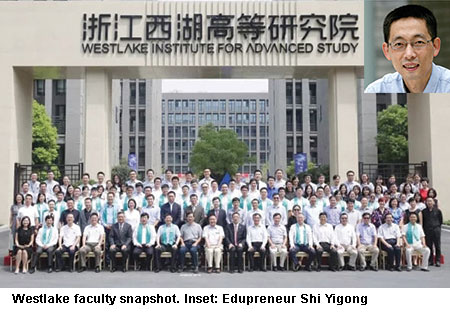China: Westlake University gamble
 Hangzhou, a city south-west of Shanghai, is freighted with meaning for Shi Yigong. His grandmother, a Communist, was jailed there by the Nationalist Chiang Kai-Shek government in the 1930s and died 18 days after giving birth to his father in prison.
Hangzhou, a city south-west of Shanghai, is freighted with meaning for Shi Yigong. His grandmother, a Communist, was jailed there by the Nationalist Chiang Kai-Shek government in the 1930s and died 18 days after giving birth to his father in prison.
Personal links drew Shi to Hangzhou when he chose a location for the first private research university in China. He called it Westlake, after the scenic body of water for which the city is famed. The local government’s enthusiasm also helped. Hangzhou, though rich and historic, compares unfavourably with Beijing and Shanghai in terms of its intellectual endowment. Keen to host a top-class university, it offered Shi tempting terms. In October, he presided over Westlake’s founding ceremony. The university’s first cohort of research students is around 140 strong. It hopes, eventually, to have thousands of students, including undergraduates.
China already has around 700 private institutions among its 3,000 universities, but most are vocational colleges which don’t aspire to compete with the research universities at the top of the global tree. Westlake University does. A former professor of molecular biology at Princeton, Shi, who still holds senior posts at Tsinghua, a leading university in Beijing, has Caltech as his model. “This is the first ever research university supported by both government and the private sector in the People’s Republic of China,” he says. “We’re making history.”
Currently housed in temporary premises, Westlake will move into a grand purpose-built campus in three years’ time. It is private in two ways. One is its governance. Shi stresses that the Communist Party will have a big role in the university. Three of the 12 seats on the managing council are taken by party officials who will play a “significant” role in decision-making. But the idea is that, unlike in other universities, the board of governors will have ultimate authority. Westlake is also partly privately financed. Although the local government is paying to build the new campus, the university also has private donors, including Pony Ma, the founder of Tencent, a tech giant, and Wang Jianlin, the founder of Dalian Wanda, a property-based conglomerate.
Shi’s ambitions reach beyond the bounds of the university. His aim is to make China more innovative by adding a dimension to the current educational system. He laments that China’s contribution to science and technology in the past 400 years has been vastly below what it could have achieved. “There’s something etched into our brains: by the time we get to college, students have lost a major portion of their innovative potential,” he says.
As dean of a department at Tsinghua — as high up the Chinese academic ladder as you can go — Shi has a lot to lose if Westlake doesn’t work. In his favour is the explicit endorsement of the venture by China’s leader, Xi Jinping. Xi wants China to become an intellectual power as well as an economic one. Against Shi is the rivalrous nature of academia and China’s tradition of conservatism. “Everybody is watching him to see if he succeeds or fails,” says a colleague. “It’s a big risk.”
















Add comment